Dental implants are an effective tooth restoration solution. However, many people worry about pain after dental implants. My Auris Dental understands this concern. This article will provide detailed information about the causes, pain relief, and care after dental implants. You will understand the process better and feel more secure when choosing dental implants.
Causes of pain after denture implantation: Inflammation, irritation and more
Have you just finished dental implantation and feel pain, swelling, and discomfort? Don’t worry too much, this is a common phenomenon. Dental implants, whether dentures or implants, are a process of intervention in the body, so it is normal for the body to react. Understanding the cause of pain will help you feel more secure and have appropriate treatment.
Infection: A threat after planting teeth
Inflammation is the leading cause of pain after dental implants. The dental implant process, even if performed at a reputable dentist with a good doctor, can still create an open wound. This wound is an ideal environment for bacteria to penetrate and cause infection.
Signs of infection:
- Severe, persistent pain that does not subside.
- Swelling of the gum area around the dental implant.
- Bleeding or pus at the implant site.
- Body fever, fatigue.
Infection, if not treated promptly, can lead to many dangerous complications, affecting oral health in particular and overall health in general. Therefore, when there are signs of infection, you need to see a dentist immediately.
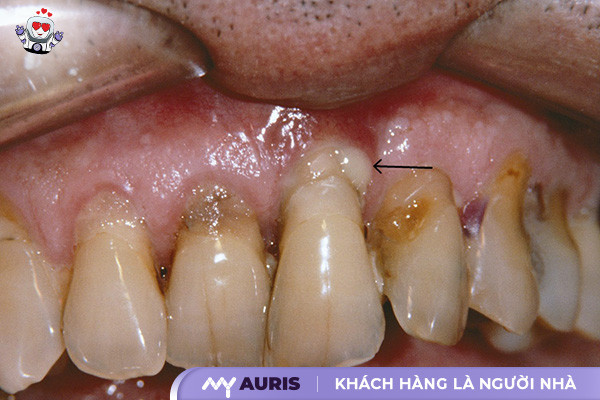
Irritation: The body’s reaction to foreign materials
Some people have sensitive bodies and are easily irritated by materials used to make dentures or implants. These materials, even though they have passed medical testing, can still cause allergic reactions in a small number of people.
Signs of irritation:
- Red, swollen, itchy gums.
- Dull, uncomfortable feeling of pain.
- Appearance of ulcers or mites.Small blisters around dentures.
Irritation is usually mild and can go away on its own after a while. However, if you feel uncomfortable, you can consult your dentist for advice on appropriate treatment.
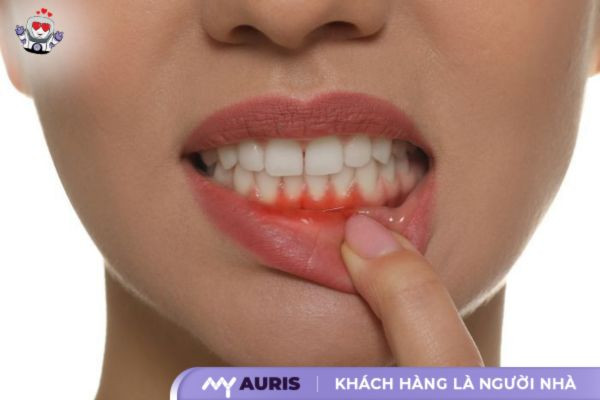
Side effects of medication: Unwanted effects
Pain relievers and antibiotics prescribed after dental implants sometimes cause side effects. Some people may experience headaches, nausea, dizziness, digestive disorders…
If you experience these side effects, you should immediately notify your dentist to adjust your medication or advise on how to minimize side effects.
Temporomandibular Joint Disorder: The Hidden Problem
Temporomandibular joint disorder (TMJ) is a disease of the joint between the lower jaw and the skull. Dental implants can change the bite, put pressure on the temporomandibular joint and lead to pain.
Signs of temporomandibular joint disorder:
- Pain in the jaw, ears, neck.
- Difficulty chewing or opening the mouth.
- There is a clicking sound when opening the mouth.
If you suspect you have temporomandibular joint disorder, you should see a dentist or specialist for diagnosis and treatment.
Other issues: Difficult factors measure
In addition to the common causes above, pain after dental implants can also be caused by a number of other problems such as:
- Injury: During the dental implant process, the jawbone or surrounding tissues may be damaged.
- Infection: Bacteria enter the wound during surgery.
- Drug allergy: Muscles May react to anesthetics, pain relievers or antibiotics.
- Nervical disorders: The nerves in the maxillofacial area are damaged.
How to relieve pain after having an implant: The secret to quick recovery
After dental implantation, are you having to endure unpleasant pain, swelling and inflammation? Don’t worry, there are many simple but effective ways to reduce pain after dental implants. Applied properly, you will quickly regain the feeling of comfort and confidence with your new teeth.
Take Painkillers: A Quick Solution
Painkillers are the first choice for pain control after dental implants. Dentists often prescribe over-the-counter painkillers such as paracetamol or ibuprofen.
Ice: Effectively reduces swelling and pain
Ice is a natural, safe and easy-to-implement method of pain relief. Ice helps constrict blood vessels, reduce inflammation and paralyze sensory nerves, thereby effectively reducing pain. results.
How to do:
- Wrap the ice in a clean towel.
- Apply to the cheek area outside the dental implant site for 15-20 minutes at a time.
- Repeat every 2-3 hours.
Salt water gargling: Hygiene, antibacterial
Salt water has a mild antiseptic effect, helping clean wounds and prevent infection. Gargling warm salt water regularly is a simple but effective way to reduce pain and promote healing.
How to do:
- Dissolve 1/2 teaspoon of salt in 250ml of warm water.
- Gently rinse your mouth for 30 seconds.
- Repeat 2-3 times each day.

Avoid eating hard or hot foods: Protect the dental implant area
During the initial period after dental implant, you should avoid eating hard, chewy or too hot foods. These foods can damage the dental implant area, increase pain and prolong healing time love.

Limit smoking and drinking alcohol: Promote the healing process injury
Smoking and drinking alcohol can slow down the healing process, increase the risk of infection and cause many other complications. Therefore, you should limit it as much as possible or, preferably, bCompletely abstain from cigarettes and alcohol during this time.
When should I see a dentist after dental implants? Warning signs you should not ignore
Tooth implants are a big step towards having a confident smile and healthy teeth. However, the recovery process after dental implants is not always smooth. Knowing when to see a dentist will help you avoid dangerous complications and ensure the best dental implant results.
Prolonged pain in dentures: Not always normal
A certain level of pain after dental implants is normal. However, if the pain lasts more than a week, increases and does not improve with painkillers, you should see a dentist immediately.
Prolonged pain can be a sign of:
- Inflammation
- Nerve damage
- Temporomandibular joint disorder
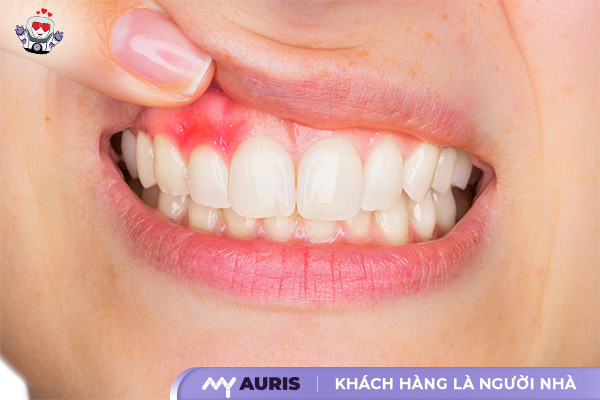
Swelling or inflammation: Signs of infection
Slight swelling of the gum area around the dental implant in the first few days is a common phenomenon. However, if the swelling spreads, accompanied by severe pain, fever, and pus discharge, you may have an infection. Infections after dental implants need to be treated promptly to avoid dangerous complications.
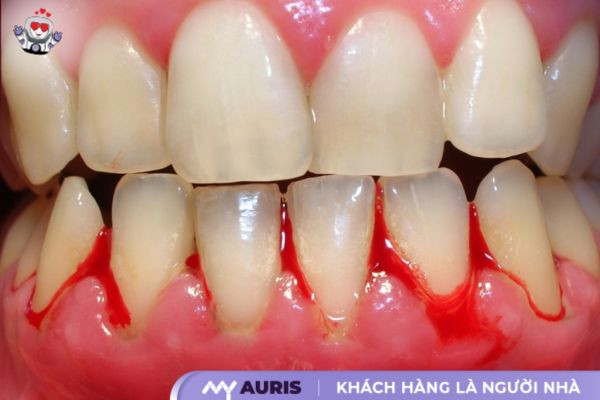
Bleeding Prolonged: Needs to be checked immediately
Slight bleeding at the dental implant site in the first 24 hours is normal. However, if bleeding persists, the blood is bright red or mixed with pus, you need to see a dentist immediately.
Prolonged bleeding can be a sign of:
- Inflammation
- Damage to blood vessels
- Coagulation disorders
Difficulty opening the mouth: Temporomandibular joint problem
Dental implants can affect the temporomandibular joint, causing difficulty opening the mouth, chewing and swallowing. If you encounter this condition, see a dentist for timely examination and treatment.
Other symptoms: Should not be subjective
In addition to the above signs, you should also see a dentist if you experience other unusual symptoms after dental implantation, such as:
- High fever
- Nausea, vomiting
- Difficulty breathing
- Allergy to medication
- Loose implant teeth
- Loss of feeling in the lip area, chin
Dental care after dental implants: Keep your smile shining for a long time
You have invested time and money in dental implants, so spend a little extra effort to take care of your teeth properly. This will help your dental implant stay beautiful, healthy and prolong its lifespan, while also preventing dental problems.
Brushing teeth and flossing daily: An indispensable habit
Brushing and flossing are the basic but most important steps in oral care after dental implants. This helps remove plaque, leftover food, and prevents bacteria from accumulating and causing infection.
- Use a soft-bristled toothbrush.
- Gently brush the area around the dental implant.
- Do not brush too hard or use a hard toothbrush.
Use dental floss:
- Use dental floss:
- Thin dental floss, gently thread between teeth.
- Be careful not to damage the gums.
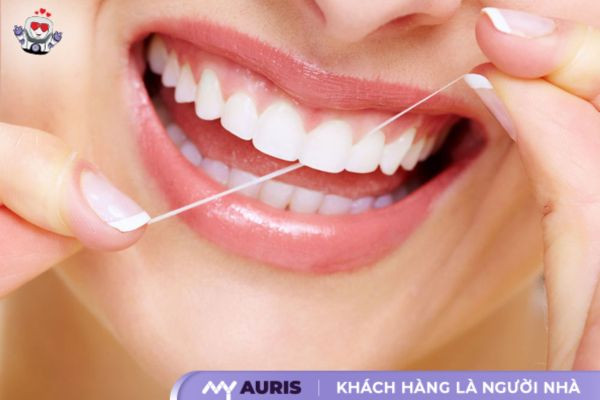
Use thin dental floss, gently thread the floss between teeth Gargling with antibacterial mouthwash: Comprehensive protection
Antibacterial mouthwash helps kill bacteria, clean the oral cavity, prevent infection and bad breath. You should use mouthwash according to your dentist’s instructions.
Periodic dental examination: Early detection, timely treatment
Regular dental examination at the dentist is necessary after dental implantation. The dentist will check the condition of the dental implant, detect problems early and provide timely treatment plans.
Check frequency:
- First 6 months after dental implant: Check every 3 months.
- After 6 months: Check every 6 months or as prescribed by the dentist.
Follow your dentist’s instructions: The key to success
The dentist will give specific instructions on how to care for teeth after dental implants, suitable for each person’s oral condition.
Strictly follow these instructions to:
- Ensure the dental implant integrates well with the jawbone.
- Prevent infection and other complications.
- Longer lasting longevity of dental implants.
Things to know about implantation Teeth: Useful information for you
Dental implants are an effective tooth restoration solution chosen by many people. However, before deciding on dental implants, you need to learn carefully about the types of implants, the dental implant process, recovery time, costs as well as the benefits and risks.
Types of dental implants: Diverse in materials and designs
Dental implants are made up of 3 main parts: implant post, abutment joint and ceramic crown. Implants are made from titanium, a highly biocompatible metal.
Implant classification is based on:
- Shape: cylindrical implant, conical implant.
- Surface: smooth surface implant, rough surface implant.
- Connection: external connecting implant, internal connecting implant.
Choosing the appropriate type of implant depends on the condition of the jawbone, the location of missing teeth and each person’s needs. Your dentist will advise you on the best type of implant.

After the implant integrates with the jawbone (about 3-6 months), the dentist will install the abutment on the post Dental implantation process: Basic steps
The dental implantation process includes the following steps:
- Examination and consultation: The dentist conducts a general examination and takes X-rays to evaluate the condition of the jawbone and plan treatment.
- Anesthesia and implant placement: The dentist will give local anesthesia, then place the implant into the jawbone.
- Installing the abutment: After the implant integrates with the jawbone (about 3-6 months), the dentist will install the abutment. abutment.
- Installing the porcelain crown: Finally, the dentist will take an impression of the jaw and make a porcelain crown that matches the color and shape of the real tooth, then attach it to the abutment joint.
Recovery time: Depends on each case
Recovery time after dental implant depends on many factors:
- General health: People in good health will recover quickly more.
- Jaw bone condition: Strong jaw bone will help the implant integration process take place quickly.
- Number of dental implants: Implanting many teeth will require longer recovery time.
- Dental implant technique: Modern dental implant technique helps shorten recovery time.
On average, complete recovery time after dental implant is about 6-9 days. month.
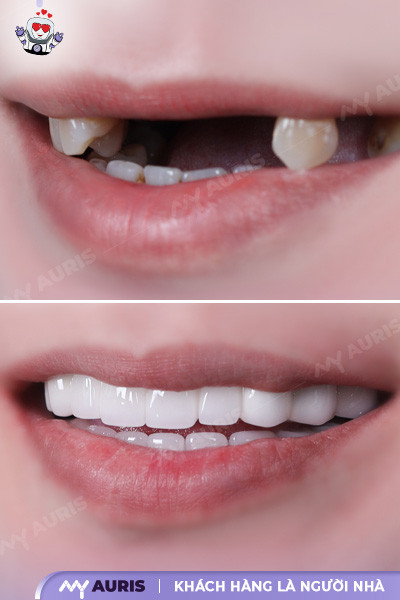
Implants help preserve jaw bone, prevent bone loss Cost of dental implants: Investing in a sustainable smile
The cost of dental implants depends on many factors:
- Type of implant: High-end implants will have a higher price.
- Number of teeth implant: Implanting more teeth will be more expensive.
- Performing dentistry: Reputable dentistry with good service quality often has higher costs.
- Promotions: Some dentists have discount programs.
You should refer to the costs at many dentists to make the right choice.
Benefits and risks of dental implants: Consider carefully before deciding
Benefits Description Good chewing ability Dental implants are highly durable, allowing you to chew comfortably like real teeth. Natural aesthetics Dental implants are similar to real teeth in shape mixed colors, bringing a natural smile. Prevents jaw bone loss Implants help preserve jaw bone, preventing bone loss due to tooth loss. High durability Dental implants can be used long-term use if properly cared for. Risks Description Infection Infection may occur at the dental implant site. Nerve damage Rare cases common, but can cause numbness in the lip and chin areas. Bleeding, swelling and pain These symptoms are usually mild and go away on their own after a few days. Implants are not integrated In some cases, implants may not fully integrate with the jawbone. Dental implants are An important decision that affects your health and aesthetics. Please read the information carefully and consult your dentist to make the right choice.
Where to get dental implants: Deciding for a perfect smile
Dental implants are an important decision, affecting your oral health and aesthetics. Choosing a reputable dentist is a key factor to ensure the best dental implant results and avoid unwanted risks.
Criteria for choosing a reputable dentist: Factors to consider
To choose a reputable dentist for dental implants, you should consider the following criteria:
- Doctors team: Dentist Doctors have high expertise and extensive experience in the field of dental implants.
- Modern technology: Dentistry applies advanced technology in the dental implant process, ensuring safety and effectiveness.
- Genuine implant materials: Using high-quality implants with clear origins, ensuring durability and biocompatibility.
- Spacious and clean facilities: Dentistry is fully equipped with modern equipment and machinery, ensuring a sterile environment.
- International standard dental implantation process: Comply with strict dental implantation process, ensuring safety and effectiveness.
- Clear warranty: The dentist has a transparent warranty policy, protecting the interests of customers.
- Reasonable cost: Dental implantation price is consistent with service quality.
- Customer reviews: Consult with those who have had dental implants at the dentist. that.

boc-rang-su-bi-nhuc-7102020-03 My Auris: Reputable dental implant dentistry
My Auris Dental is one of the reputable dental implant addresses at: 11Bis Nguyen Gia Thieu, Ward 6, District 3, Ho Chi Minh City.
My Auris is committed to providing customers with high-quality dental implant services with:
- A team of experienced, dedicated doctors.
- Advanced dental implant technology.
- Genuine imported implant materials.
- Modern, sterile facilities.
- International standard dental implant process.
- Long-term warranty.
- Reasonable and transparent costs.
WTS (Way to Smile) process at My Auris – a comprehensive, meticulous care process built step by step to bring optimal results for the health and beauty of the smile.
Compare dental clinics: Find the most suitable address
Before deciding If you are planning to have dental implants, you should compare dentists based on the criteria mentioned above. You can search for information on the dentist’s website, fanpage or consult with friends and relatives.
Some factors to compare:
- Experience and expertise of the doctor.
- Technology and equipment.
- Type used implants.
- Cost and warranty.
Customer reviews: Worthwhile reference trust
Customer reviews are a valuable source of information to help you evaluate the quality of dental services. You can read reviews on the dentist’s website, fanpage, forums, and oral care groups.
Having pain after tooth implantation is a common phenomenon. Understanding the causes, treatment, and post-operative care will help you minimize discomfort. My Auris Dental Clinic with a team of experienced doctors, modern technology, committed to accompanying you. Please contact My Auris Dental Clinic immediately for a free examination and consultation. class=”social-icons share-icons share-row relative”>






